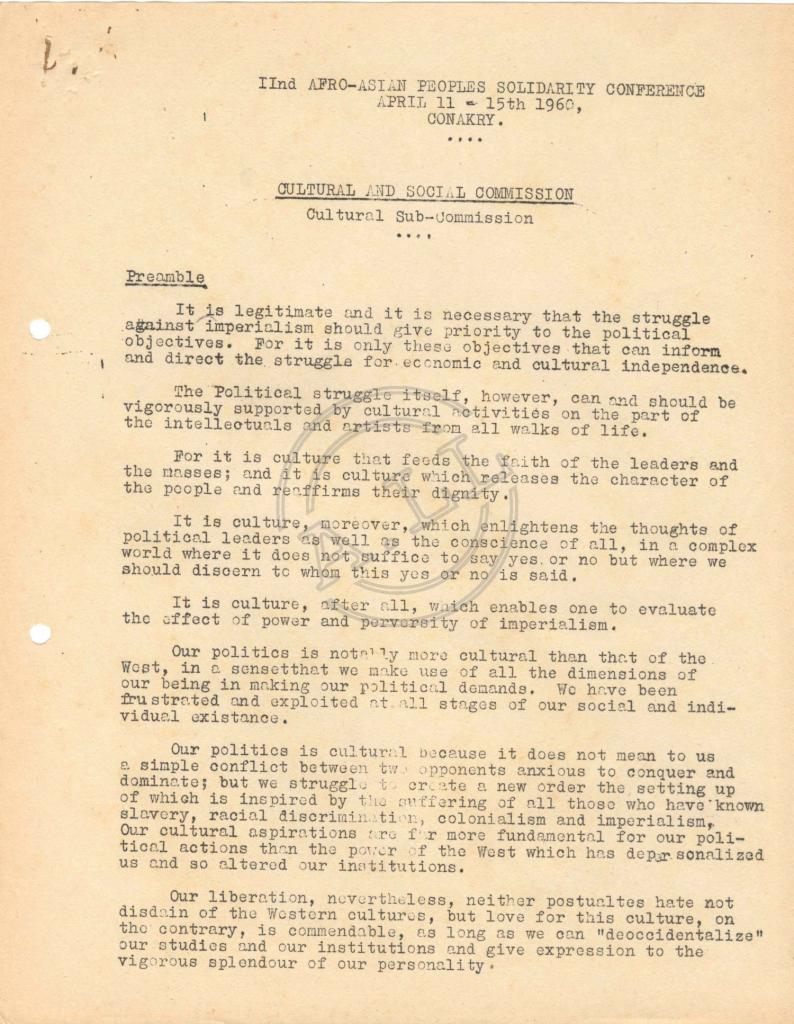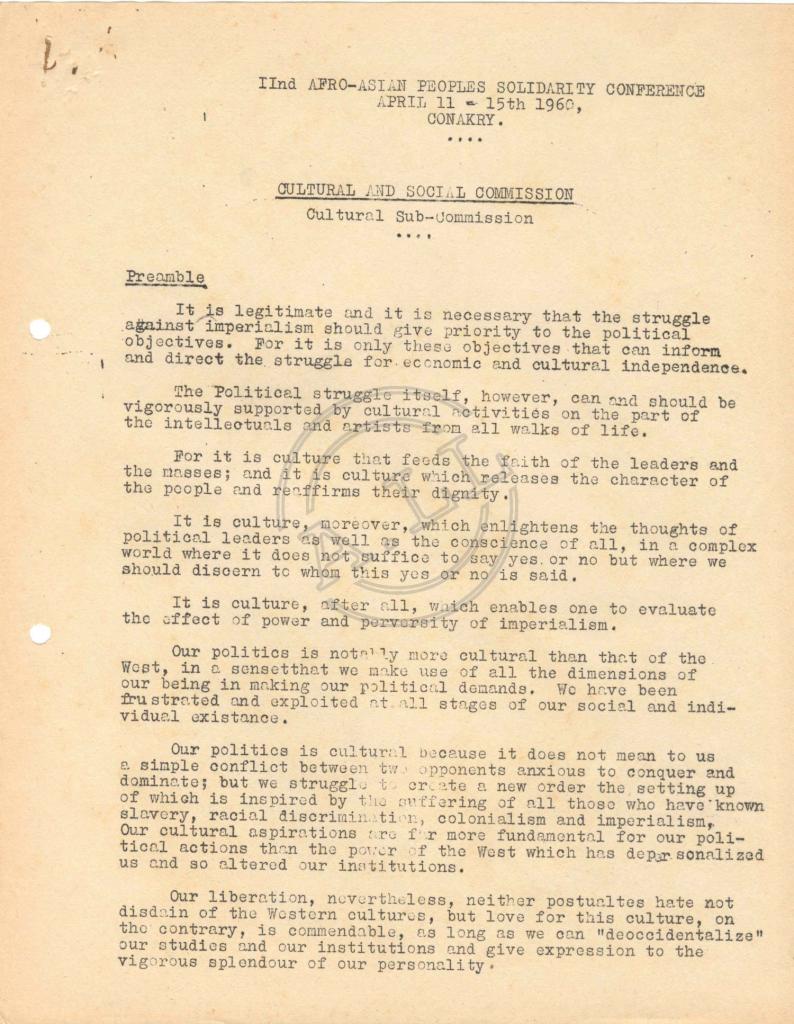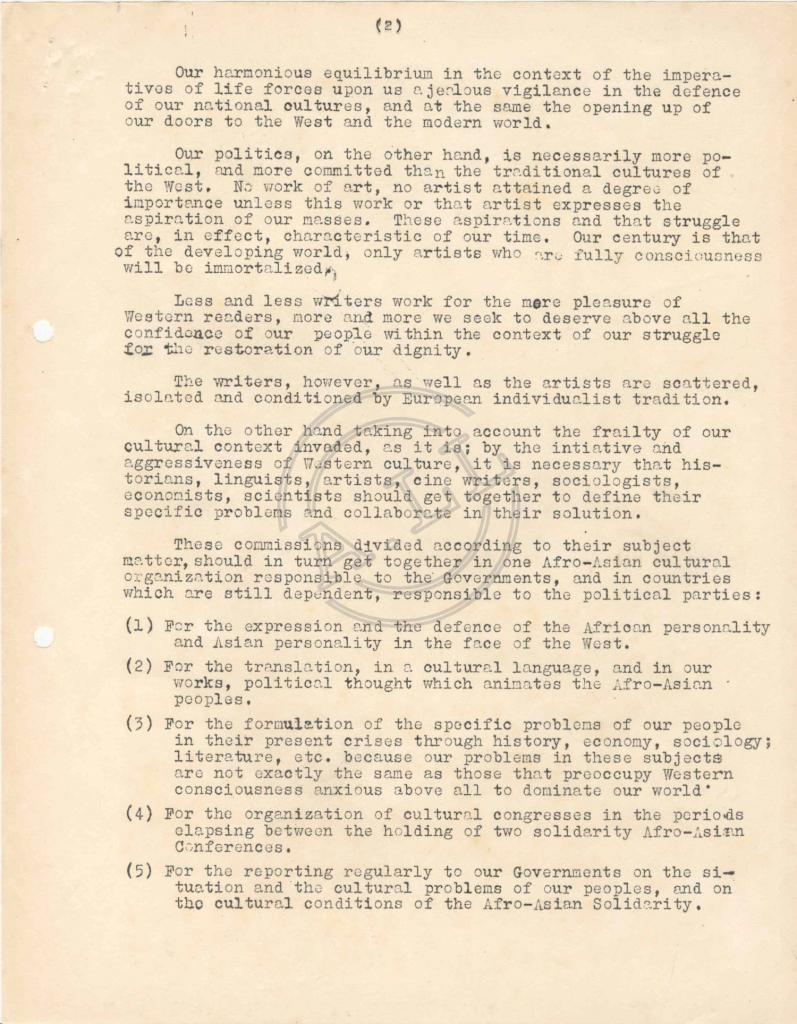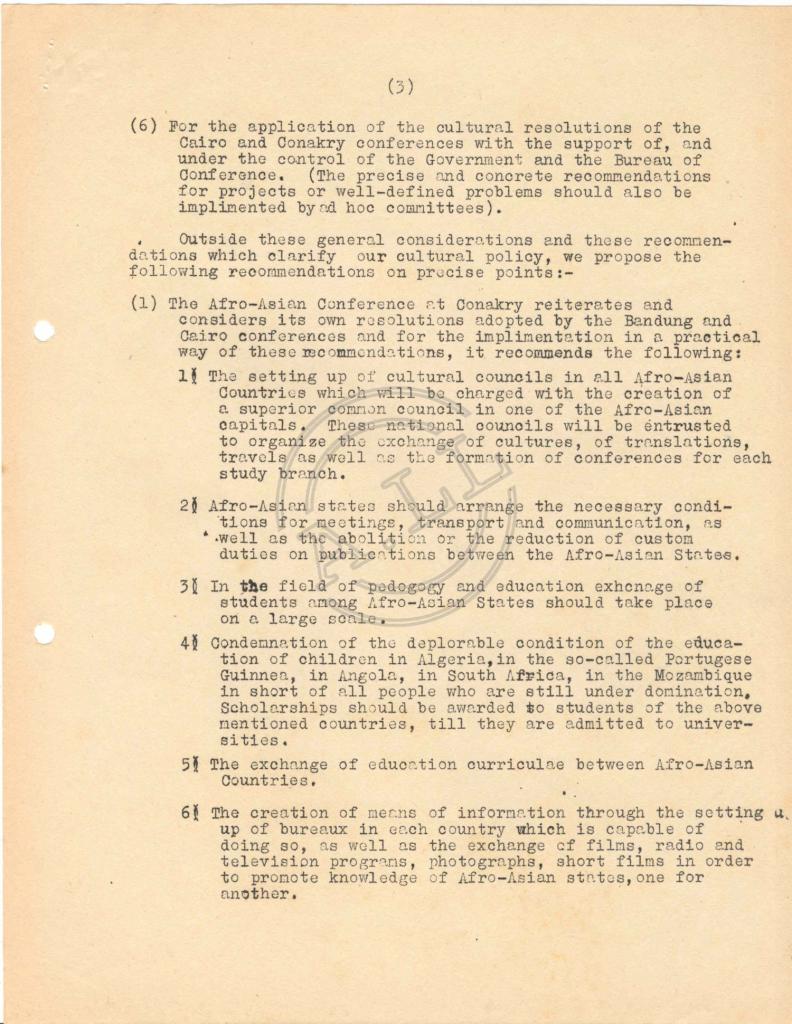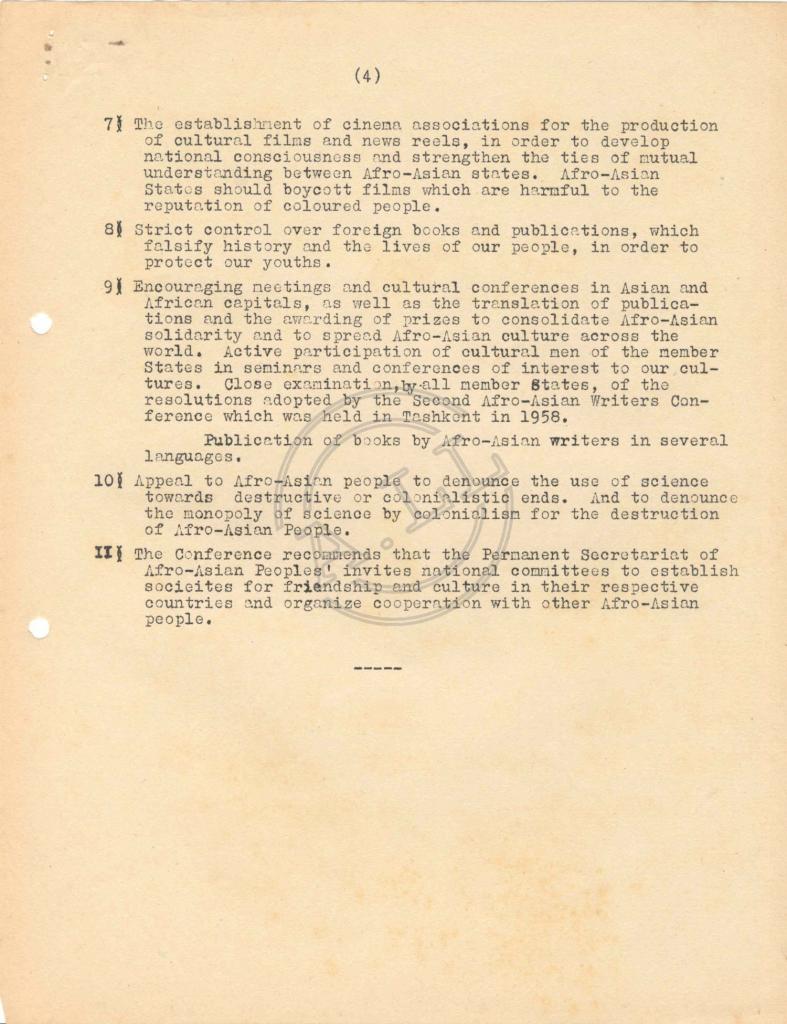II AFRO-ASIAN PEOPLES SOLIDARITY CONFERENCE
APRIL 11 - 15TH 1960
CONARKY.
....
CULTURAL AND SOCIAL COMMISSION
Cultural Sub-Commission
....
Preamble
It is legitimate and it is necessary that the struggles against imperialism should give priority ti the political objectives. For it is only these objectives that can inform and direct the struggle for economic and cultural independence.
The Political Struggle itself, however, can and should be vigorously supported by cultural activities on the part of the intellectuals ad artists from all walks of life.
For it is culture that feeds the faith of the leaders and the masses; and it is culture which releases the character of the people and reaffirms their dignity.
It is culture, moreover, which enlightens the thoughts of political leaders as well as the conscience of all, in a complex world where it does not suffice to say yes or no but where we should discern to whom this yes or no is said.
It is culture, after all, which enables one to evaluate the effect of power and perversity of imperialism.
Our politics is notably more culturas than that of the West, in a sense that we make use of all the dimensions of our being in making our political demands. We have been frustrated and exploit at all stages of our social and individual existence.
Our politics is cultural because it does not mean to us a simple conflict between two opponents anxious to conquer and dominate; but we struggle to create a new order the setting up of which is inspired y the suffering of all those who have known slavery, racial discrimination, colonialism and imperialism. Our cultural aspirations are far more fundamental for our political actions than the power of the West which has depersonalized us and so altered our institutions.
Our liberation, nevertheless, neither postulates hate not disdain of the Western cultures, but love for this culture, on the contrary,is commendable, as long as we can “deoccidentalize” our studies and our institutions and give expression to the vigorous splendour of our personality.
Our harmonies equilibrium in the context of the imperatives of life forces upon us a jealous vigilance in the defence of our national cultures, and at the same the opening up of our doors to the West and the modern world.
Our politics, on the other hand, is necessarily more political, and more committed than the traditional cultures of the West. No work of art, no artist attained a degree of importance unless this work or that artist expresses the aspiration of our masses. These aspirations and that struggle are, in effect, characteristic of our time. Our century is that of the developing world, only artists who are fully consciousness will be immortalized.
Less and less writers work for the more pleasure of Western readers, more and more we seek to deserve above all the confidence of our people within the context of our struggle for the restoration of our dignity.
The writers, however, as well as the artists are scattered, isolated ad conditioned by European individualist tradition.
On the other hand taking into account the frailty of our cultural context invaded, as it is; by the initiative and aggressiveness of Western culture, it is necessary that historians, linguists, artists, cine writers, sociologists, economists, scientists should get together to define their specific problems and collaborate in their solution.
These commissions divided according to their subject matter, should in turn get together in one Afro-Asian cultural organisation responsible to the Governments, and in countries which are still dependent, responsible to the political parties:
(1) For the expression and the defence of the African personality and Asian personality in the face of the West.
(2) For the translation, in a cultural language, and in our works, political thought which animates the Afro-Asian peoples.
(3) For the formulation of the specific problems of our people in their present crises through history, economy, sociology; literature, etc. because our problems in these subjects are not exactly the same as those that preoccupy Western consciousness anxious above all to dominate our world.
(4) For the organisation of cultural congresses in the periods clasping between the holding of two solidarity Afro-Asian Conferences.
(5) For the reporting regularly to our Governments on the situation and the cultural problems of our peoples, and on the cultural conditions of the Afro-Asian Solidarity.
(6) For the application of the cultural resolutions of the Cairo and Conakry conferences with the support of, and under the control of the Government and the Bureau of Conference. (the precise and concrete recommendations for projects or well-defined problems should also be implemented by hoc committees).
Outside these general considerations and these recommendations which clarify our cultural policy, we propose the following recommendations on precise points:-
(1) The Afro-Asian Conference at Conakry reiterates and considers its own resolutions adopted by the Bandung and Cairo conferences and for the implementation in a practical way of these recommendations, it recommends the following:
1. The setting up of cultural councils in all Afro-Asian Countries which will be charged with the creation of a superior common council in one of the Afro-Asian capitals. These national councils will be entrusted to organize the exchange of cultures, of translations, travels as well as the formation of conferences for each study branch.
2. Afro-Asian states should arrange the necessary conditions for meeting, transport and communication, as well as the abolition or the reduction of custom duties on publications between the Afro-Asian States.
3. In the field of pedagogy and education exchange of students among Afro-Asian States should take place on a large scale.
4. Condemnation of the deplorable condition of the education of children in Algeria, in the so-called Portuguese Guinea, in Angola, in South Africa, in the Mozambique in short of all people who are still under domination, Scholarships should be awarded to students of the above mentioned countries, till they are admitted to universities.
5. The exchange of education curricula between Afro-Asian Countries.
6. The creation of means of information through the setting up of bureaux in each country which is capable of doing so, as well as the exchange of films, radio and television programs, photographs, short films in order to promote knowledge of Afro-Asian states, one for another.
7. The establishment of cinema associations for the production of cultural films and news reels, in order to develop national consciousness and strengthen the ties of mutual understanding between Afro-Asian states. Afro-Asian States should boycott films which are harmful to the reputation of coloured people.
8. Strict control over foreign books and publications, which falsify history and the lives of our people, in order to protect our youths.
9. Encouraging meetings and cultural conferences in Asian and African capitals, as well as the translation of publications and the awarding of prizes to consolidate Afro-Asian solidarity and the spread Afro-Asian culture across the world. Active participation of cultural men of the member States in seminars and conferences of interest to our cultures. Close examination, by all member States, of the resolutions adopted by the Second Afro-Asian Writers Conference which was held in Tashkent in 1958.
Publication of books by Afro-Asian writers in several languages.
10. Appeal to Afro-Asian people to denounce the use of science towards destructive or colonialist ends. And to denounce to monopoly of science by colonialism for the destruction of Afro-Asian People.
11. The Conference recommends that the Permanent Secretariat of Afro-Asian People’s invites national committees to establish societies for friendship and culture in their respective countries and organize cooperation with other Afro-Asian people.
II Conferência de solidariedade dos povos afro-asiáticos (1 a 15 de Abril 1960 - Conakry) - Comissão Cultural e Social - Sub-comissão Cultural
